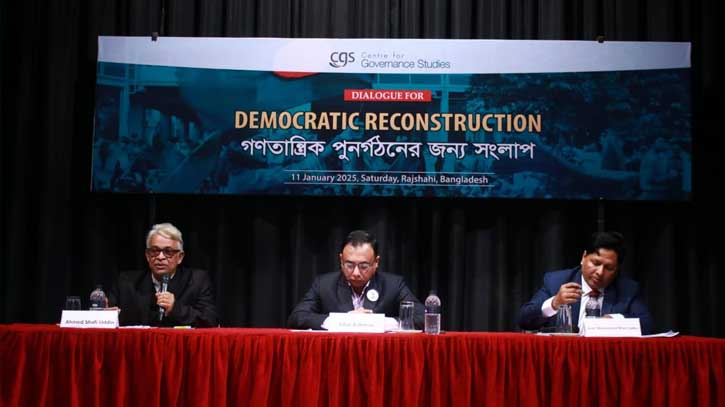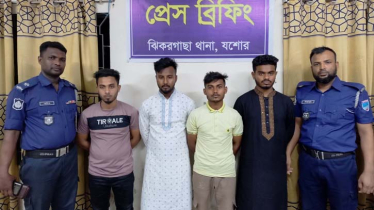
Photo: Collected
Speakers at a regional dialogue in Rajshahi have said that regional participation should be ensured in the country's reconstruction in an inclusive manner. During the "Dialogue for Democratic Reconstruction" organised by the Centre for Governance Studies (CGS) at Rajshahi Shilpakala Academy on Saturday, the people of the district urged for the inclusion of representatives from all sectors in the governance system to help rebuild the nation and democracy.
Prof of the Department of Accounting and Information Systems and Pro-Vice Chancellor at University of Rajshahi Dr Mohammad Main Uddin, and President of Shujan (Rajshahi district) Ahmed Shafi Uddin were present at the event, moderated by CGS Executive Director Zillur Rahman.
Teachers, students, lawyers, politicians, industrial entrepreneurs, civil society members, media professionals, activists, small business owners, women entrepreneurs, volunteers and professionals from various sectors provided valuable insights on reforms at the event.
Dr Main Uddin emphasised the need for reform or reconstruction in the wake of a nation's systemic collapse, and highlighted that when the system of a nation collapses, reform becomes imperative.
He also focused on the destruction of institutions under the previous regime and noted that the student revolution has opened the door for reform. He, however, raised a critical question: "Whom will we entrust with the authority to reform after decisions to reform are made?"
Citing the March 7, 1973, election, he criticized those in power for undermining the electoral system by declaring "Bakshal".
He stressed the importance of ensuring that power does not return to such individuals and called for greater unity in ideology among those involved in the July uprising of Bangladesh.
Ahmed Shafi Uddin proposed that the term "governance" or "regime" be replaced with "good governance."
He criticised decisions made by the elite class being imposed on 18 million people and underscored the necessity of regional decentralization within the regime system, and recommended opposition parties should build a shadow government to address existing challenges.
Zillur Rahman cautioned against replacing one fascist regime with another, asserting that the leaders of the 'Freedom Uprising of July' cannot claim exclusive ownership of the movement.
Addressing calls for immediate reform, he acknowledged the urgency but reminded everyone that "reform is a never-ending process." Whoever holds power must remain accountable to people and open to criticism, he asserted.
BNP Adviser Mizanur Rahman Minu said BNP has already provided 31 points of demands for national reform. "If BNP ever comes to power through national election, they will offer the people of Bangladesh a new country."
He expressed his optimism that no fascist regime will be allowed in the soil of democratic Bangladesh. Among the participants, a human rights activist highlighted the lack of understanding of human rights among political party leaders.
Previous regimes have been responsible for widespread human rights violations, calling for greater awareness and accountability in this area, urging immediate attention.
A representative of the Jatiya Adivasi Parishad lamented the lack of progress even after 53 years of independence, and called for greater inclusivity and recognition of marginalised groups.
Messenger/JRTarek








